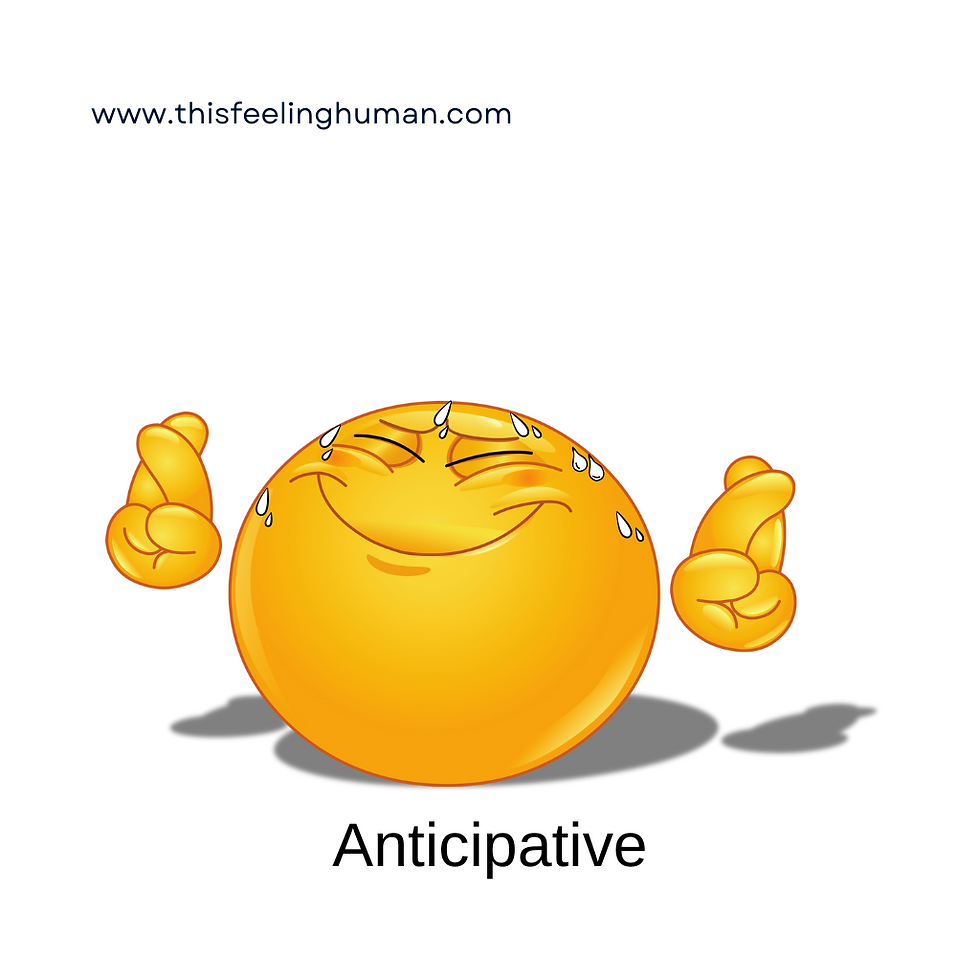The Story of Apprehension: Transforming Worry Into Purposeful Action
- TFH

- Nov 25, 2024
- 6 min read
Updated: Nov 26, 2024
The Emotions Library project is a collection of stories about the emotion(s) we experience. Stories bring meaning and clarity, helping us understand our emotions better. We do this so everyone can access knowledge, gain emotional literacy, and develop self-awareness. Today, we’re diving into one of the most natural and purposeful emotions we can experience: apprehension.

Far from being a mere obstacle, apprehension is a vital signal in our lives. It emerges during moments of uncertainty and possibility, nudging us toward preparation, reflection, and mindfulness. While it may feel overwhelming at times, apprehension holds the potential to guide us toward growth and resilience when we learn to embrace it.
Story: Feeling anxious about potential future outcomes.
Impulse: Hesitate or act cautiously.
Etymology: From Latin apprehendere, meaning to grasp or seize.
Purpose: Apprehension signals the need for preparation and mindfulness.
Emotional Regulation and Journaling
In partnership with Calm3D, we offer a safe space for emotional regulation, helping you cultivate peace, safety, and security as you explore your emotional experiences, especially those involving apprehension and self-discovery.
Visit www.playcalm3d.com to create the time and space to reflect on your feelings, practice emotional balance, and reconnect with a sense of clarity and calm in life’s most uncertain moments.
Reflective Questions
1. What specifically are you worried might happen?
2. How can you prepare yourself for the outcome you fear?
3. What would help you feel more grounded right now?
Let’s explore how apprehension manifests, why it’s essential, and how we can navigate it constructively to make it a source of strength rather than fear.
Feeling Anxious About Potential Future Outcomes
Apprehension often emerges during pivotal moments—when you’re standing at the crossroads of decision and action. Picture this: you’ve been invited to deliver a presentation at work, a task that excites and terrifies you. As the day approaches, your mind races with “what ifs.” What if I forget my lines? What if people think my ideas aren’t good enough? The more you dwell on these thoughts, the heavier the sense of unease becomes.
This is the essence of apprehension: anxious anticipation when faced with uncertain future outcomes. It’s a universal experience, one that can either motivate us to prepare or paralyze us with fear. Understanding this emotional response is key to harnessing its power constructively.
Ted’s story, like many others, is a prime example of how apprehension can feel both overwhelming and necessary.

The Day Before the Leap
Ted sat at his desk, staring at the email draft on his computer screen. The cursor blinked back at him like a silent metronome, counting down the seconds until he’d have to hit send. he read the subject line again: "Application for Freelance Contributor Position". It was straightforward enough, but his chest tightened every time he looked at it.
It wasn’t that Ted didn’t want the opportunity—he did. Ever since graduating from college, he’d dreamed of seeing his writing published in the kinds of magazines he grew up reading. But that dream had always felt like a distant possibility, a "someday" aspiration. Now, with the chance right in front of him, apprehension rooted in his place.
“What if I’m not good enough?” he muttered to himself. “What if they read my submission and laugh? Or worse—what if they don’t respond at all?” his mind spiraled into a loop of imagined scenarios, each one darker than the last. Ted leaned back in his chair and closed his eyes, willing himself to breathe. One step at a time, he thought.
Impulse: Hesitate or Act Cautiously
When you feel apprehensive, your natural impulse is often to hesitate. Ted’s hesitation showed up as overthinking. he hovered over his email draft, rereading it endlessly, tweaking minor details and questioning whether his samples were polished enough.
Apprehension isn’t telling you to stop; it’s urging you to approach with awareness and intention. But it also tempts you to freeze, over-prepare, or shy away from taking the next step. While preparation is useful, too much can prevent you from moving forward at all.
Ted’s apprehension wasn’t new—it had shown up at every major decision in his life. But this time, he felt it more strongly. His hands hovered over the keyboard, motionless.
The Origins of 'Apprehension'
The word apprehension is rooted in the Latin apprehendere, which means “to grasp or seize.” This origin provides a deeper understanding of the emotion. On one hand, apprehension is about “grasping” potential risks—becoming acutely aware of the things that might go wrong. On the other hand, it also implies an opportunity to “seize” control and take meaningful action despite those risks.
Ted realized his apprehension wasn’t trying to stop him; it was pointing out how much this moment mattered. His fear wasn’t a barrier—it was a sign that his dream was worth pursuing.
Purpose: Apprehension Signals the Need for Preparation
Apprehension serves an essential purpose in our emotional toolkit. It’s a signal from our mind and body, alerting us to potential challenges that require our attention. For Ted, his apprehension reminded him to take his application seriously, to prepare thoughtfully, and to reflect on his goals.
By the time he revisited his email draft, he had a moment of clarity: This matters to me, and that’s why it feels so scary. His apprehension was a call to step into a mindful state. It reminded him to slow down, think critically, and take purposeful action.

Rather than letting the fear consume him, he took a deep breath and opened his notebook, where he’d written:
To grow as a writer.
To challenge myself.
Because I believe my voice matters.
Emotional Literacy: Understanding and Expressing Apprehension
Apprehension, the anxious anticipation of uncertain outcomes, is a natural and purposeful emotion. It often arises in pivotal moments when we face potential growth or challenge, signaling the need for preparation and mindfulness. While it can lead to hesitation or over-preparation, apprehension isn’t meant to stop us; it’s a guide that highlights what matters most.
By developing emotional literacy—the ability to recognize, understand, and express emotions—we can navigate apprehension more effectively. Naming the emotion, understanding its roots, and expressing it through journaling, conversations, or self-reflection transform apprehension from a barrier into a tool for growth.
Through mindful reflection and preparation, apprehension can empower us to move forward with confidence and resilience, reminding us that fear and hope often coexist in moments of meaningful opportunity. Instead of resisting it, we can embrace apprehension as a sign that we are stepping into something worthwhile.
Reflective Questions
When faced with apprehension, taking the time to reflect can help you regain perspective and control. These questions guided Ted as he turned his hesitation into action:

What specifically are you worried might happen?
Ted’s fear of rejection felt overwhelming until he broke it down: he was afraid of being overlooked, of his ideas not being good enough, of wasting time. Naming these fears made them feel smaller and more manageable.
How can you prepare yourself for the outcome you fear?
His preparation was thorough—polishing his resume, curating his portfolio, and practicing his pitch. While he couldn’t control the outcome, he focused on what he could control: showing up fully prepared.
What would help you feel more grounded right now?
When Ted felt overwhelmed, he grounded himself by journaling and revisiting his reasons for pursuing this opportunity. It reminded him of his goals and helped him stay present.
Apprehension is a natural and necessary emotion. It’s not meant to stop you but to guide you—to help you prepare, reflect, and approach life’s challenges with care.
Ted clicked Send. His heart raced, but he leaned into the moment with curiosity and courage. The apprehension didn’t disappear, but it transformed—from a barrier into a stepping stone.
The next time you feel apprehensive, remember that this emotion has a purpose. Reflect on your fears, prepare for what lies ahead, and ground yourself in the present. Like Ted, you’ll discover that apprehension isn’t just a source of anxiety—it’s also an opportunity for growth, resilience, and mindful action.
Final Thoughts
If Ted’s experience of apprehension resonates with you and you’re ready to deepen your emotional understanding, explore Emoli Cards. These cards help you articulate emotions like apprehension and self-doubt, guiding you through moments of uncertainty and offering clarity into your emotional landscape.
For personalized support, book an Emotions-Based Coaching session. Together, we’ll explore your feelings, uncover your strengths, and work toward greater self-awareness. Take the first step on your journey to emotional resilience and empowerment today!



Comments